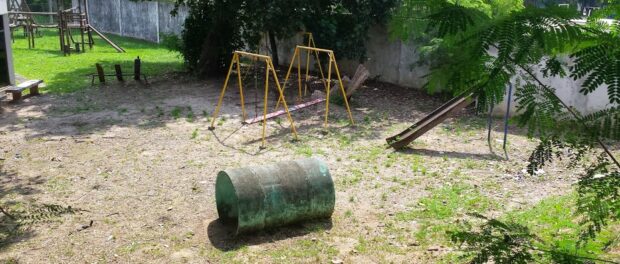
As Cascadura, a neighborhood in Rio’s North Zone, faces mobility and economic challenges due to recent changes to transportation routes, communities in the neighborhood are also confronting hardships in recreation, education, and health.
Local leaders and residents are speaking out against the lack of investment by the municipal government in Cascadura’s community park, public school, and local clinic.
Orlando Leite Public Park
Orlando Leite park is like most other parks in a big city. There is a large gated entrance, grass, trees, and two medium-sized soccer pitches. It is an average-sized space, community leader Jandira Mariana da Rocha said, that simply needs a bit more care and attention.
“[The City] undervalues the park, and I don’t know why. It’s a wonderful space. So many children and elderly visit it at the end of the day,” she said.
The park is used by residents of Cascadura communities and surrounding neighborhoods, de Rocha said. It is not only a place for exercise, but a community meeting point and a political space.
De Rocha also disclosed that in August of last year, Mayor Eduardo Paes promised to begin park renovations in early September to add bathrooms and a playground, improve the soccer pitches, and make other additions to the space. However, the City suspended the construction. Park renovations are now slated for this month, about eight months after the original date.
According to the leader of the 6 de Maio, Sonhar e Realizar youth sports organization, José Fernando Silva, one of the main problems with the park is its infrastructure. The park was built more than 30 years ago and hasn’t undergone any renovations since then.
Victor Bruno, a 25-year-old resident of Cascadura and member of the same sports organization since childhood, said one of the soccer pitches is infested with weeds and always floods when it rains. The other, a cement court, has several crevices that trip and injure its users. The lighting in the park has improved in the last year with the installation of new lights, he said, but the park remains dark and unsafe at night.
“If there were a project placing municipal guards here, to make it a closed space, we could even have the infrastructure for a kiosk on the weekends,” Bruno said. “Investment. What’s missing here is investment.”
In the past, the park was a place associated with violence and drugs. Drug users would often congregate inside, and dead bodies would be dumped there by local gangs.
“Any urban space that is abandoned by the State becomes a marginalized space,” Silva said. “In any place where the government doesn’t act, where it becomes neglectful, violence will take over.”
Fifteen years ago, the establishment of Silva’s sports organization radically changed the area’s image. The project continues to train youth in sports today.
“Children and young people worked as peace mediators. The drug users would leave,” Silva recalled. “We use sports as an instrument, a tool to get [the children] involved and free them of the surrounding violence, and to help them dream about better paths.”
De Rocha said residents remain skeptical as to if and when the promised renovations will happen.
Mauricio Manuel Albuquerque CIEP Public School
The M.M. Albuquerque public school is located next to Orlando Leite Park and the building’s infrastructure is good, Silva said. However, the same cannot be said of the school’s playground.
“Because of the rain, the playground and the court where students play both have flood problems,” Silva said.
Miguel Silva de Moura, president of the Luiz Carlos Prestes Neighborhood Association, said the school serves children aged 4 – 11, but they have no areas in which to play now.
“Soon the school will have to close, it’s being so poorly maintained,” he said. “The Mayor has not provided any books, shoes, or shirts. The children have no uniforms and we are nearing the end of the school year.”
An even more pressing issue is the recent change to the school schedule. Silva said former school hours ran from 8am to 5pm, which meant students were provided breakfast, lunch, and dinner, which have now been reduced.
“Today, I believe the fact that children begin school at 7:20am and get out at 2:30pm is such a violent act against mothers,” Silva said. “What happens to the children who need those meals? So the biggest problem at the [school] is that issue.”
Health Clinic
The local clinic was established about 20 years ago and very few improvements have been made to its infrastructure since then. According to Silva, the clinic lacks important equipment, doesn’t have enough rooms and only has one bathroom for the 36,297 registered patients.
There are also a limited number of physicians and the clinic does not have doctors available every day of the week. Specialists such as pediatricians and gynecologists have a strict schedule of only two days a week. In the past, Silva said, the team was more complete and there would be full medical care every day. Now, on the days when specialists are available patients line up at 5am to get an appointment with doctors who arrive around 9am.
According to De Rocha, the quality of care is also questionable.
“I’ve seen many bad and sad things there in terms of patient service. The government should clear out the current staff and replace them with better qualified people,” she said. “They should be prepared to provide service to these people… We have suffered enough.”
Mayor Eduardo Paes visited the clinic last year and assured the community he would look into resolving some of its issues, but nothing has been done since then, Silva said.
“[He] told us he would pay special attention to the clinic, and we are still waiting on that attention now.”




